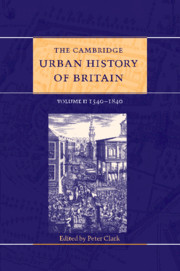Book contents
- Frontmatter
- 1 Introduction
- Part I Area surveys 1540–1840
- Part II Urban themes and types 1540–1700
- Part III Urban themes and types 1700–1840
- 14 Urban growth and economic change: from the late seventeenth century to 1841
- 15 Population and society 1700–1840
- 16 Politics and government 1700–1840
- 17 Culture and leisure 1700–1840
- 18 The transformation of urban space 1700–1840
- 19 London 1700–1840
- 20 Regional and county centres 1700–1840
- 21 Ports 1700–1840
- 22 Small towns 1700–1840
- 23 Health and leisure resorts 1700–1840
- 24 Industrialising towns 1700–1840
- 25 Conclusion
- Select Bibliography
- Index
- References
16 - Politics and government 1700–1840
from Part III - Urban themes and types 1700–1840
Published online by Cambridge University Press: 28 March 2008
- Frontmatter
- 1 Introduction
- Part I Area surveys 1540–1840
- Part II Urban themes and types 1540–1700
- Part III Urban themes and types 1700–1840
- 14 Urban growth and economic change: from the late seventeenth century to 1841
- 15 Population and society 1700–1840
- 16 Politics and government 1700–1840
- 17 Culture and leisure 1700–1840
- 18 The transformation of urban space 1700–1840
- 19 London 1700–1840
- 20 Regional and county centres 1700–1840
- 21 Ports 1700–1840
- 22 Small towns 1700–1840
- 23 Health and leisure resorts 1700–1840
- 24 Industrialising towns 1700–1840
- 25 Conclusion
- Select Bibliography
- Index
- References
Summary
in the 1830s, critics of the ‘borough system’ – of a parliament heavily weighted towards the representation of small boroughs – and of ‘unreformed’ municipal government portrayed British urban governmental institutions as hidebound, as having failed to adapt to changing times. It is true that, from 1700 to the 1830s, there was little change in the formal institutions either of parliamentary representation or of borough government. Scottish burghs gained representation in the Westminster parliament after the Union of 1707 (and Irish boroughs after the Union of 1800). From the 1770s, would-be parliamentary reformers succeeded in getting the constituency boundaries of three notoriously corrupt parliamentary boroughs redrawn, and one such borough disfranchised. But more radical changes – the disfranchisement of dozens of smaller boroughs, and enfranchisement of large unrepresented towns – had to await the Reform Act of 1832. Similarly, very few new corporate charters were issued after 1700 (though in Scotland, a scattering of burghs of barony were created). Even passage of the 1835 English and Welsh Municipal Corporations Act did not radically change the picture here: among the major unincorporated towns, only Manchester and Birmingham sought incorporation in the remainder of that decade.
By contrast, this was of course an era of striking social, economic and cultural change. National population tripled; the urban share of population grew and there were changes in the urban hierarchy as various industrial and other economically specialised kinds of town rose towards the top of the pile. Towns became the sites of more or less vigorous associational life (now formally tolerated dissenting congregations being among the earlier manifestations of voluntarism).
- Type
- Chapter
- Information
- The Cambridge Urban History of Britain , pp. 529 - 574Publisher: Cambridge University PressPrint publication year: 2000
References
- 27
- Cited by

